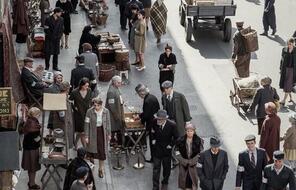A Basic Feeling of Human Dignity
Holocaust scholars believe that the Nazis established more than 40,000 camps and ghettos, where they imprisoned millions of people. 1 Some camps were created solely to serve as killing centers. Others were labor camps, where the prisoners were forced into slave labor. Still others were transit camps, where prisoners were held temporarily before being transferred to other concentration camps or killing centers. While all prisoners in every camp were subject to extreme hunger, deprivation, torture, abuse, and often death, their specific experiences varied widely because of the large number of camps and the variety of purposes they served.
Hanna Lévy-Hass was a Yugoslavian teacher imprisoned in the Bergen-Belsen concentration camp in Germany. She was held in a part of the camp for “exchange prisoners”—prisoners that the Nazis thought they might be able to exchange for Germans held prisoner by other countries. The exchange prisoners included many children.
Lévy-Hass wrote in her diary about both the loss of human dignity she and others suffered and how they sought to restore it.
November 8, 1944
I would love to feel something pleasant, aesthetic, to awaken nobler, tender feelings, dignified emotions. It's hard. I press my imagination, but nothing comes. Our existence has something cruel, beastly about it. Everything human is reduced to zero. Bonds of friendship remain in place only by force of habit, but intolerance is generally the victor. Memories of beauty are erased; the artistic joys of the past are inconceivable in our current state. The brain is as if paralyzed, the spirit violated.
The moral bruises run so deep that our entire being seems atrophied by them. We have the impression that we're separated from the normal world of the past by a massive, thick wall. Our emotional capacity seems blunt, faded. We no longer even remember our own past. No matter how hard I strive to reconstruct the slightest element of my past life, not a single human memory comes back to me.
We have not died, but we are dead. They've managed to kill in us not only our right to life in the present and for many of us, to be sure, the right to a future life . . . but what is most tragic is that they have succeeded, with their sadistic and depraved methods, in killing in us all sense of a human life in our past, all feeling of normal human beings endowed with a normal past, up to even the very consciousness of having existed at one time as human beings worthy of this name.
I turn things over in my mind, I want to . . . and I remember absolutely nothing. It's as though it wasn’t me. Everything is expunged from my mind. During the first few weeks, we were still somewhat connected to our past lives internally; we still had a taste for dreams, for memories. But the humiliating and degrading life of the camp has so brutally sliced apart our cohesion that any moral effort to distance ourselves in the slightest from the dark reality around us ends up being grotesque—a useless torment. Our soul is as though caught in a crust that nothing can soften or break . . .
November 18, 1944
In spite of everything, my work with the children continues. . . . I cling desperately to every chance, however slight, to gather the children together to foster in them and in me even the slightest mental sharpness, as well as a basic feeling of human dignity.
It was decided in the camp that Saturdays will be devoted to children's entertainment, mostly of a religious nature. In our barracks, we are also taking advantage of Saturdays to provide the children with some amusement, but adapted mostly to the overall mentality of the people here: oral recitations, singing solo or in chorus, small theatrical productions. Given the total lack of books, I collect and write down the material for these performances based on the children's memories and my own and more often than not, we must resort to improvising texts or poetic lines. A whole throng of known tunes have been recovered thanks to the tireless efforts and concentration of all my students—but the words escape us as if they had been sucked into a pit. So we begin to invent lines, to rhyme, to create texts that affect us deeply, to invoke our distant homeland, glorious and heroic . . .
I carry out this task spontaneously, even instinctively I would say, through an irresistible need in my soul—in the rare moments when I manage to awaken it—and by an irresistible need that I can clearly sense coming from the children's souls. Because they take my lead, they get excited, they want to live, they want to rejoice, it's stronger than them. What heartbreak! 2
Connection Questions
- What conditions are necessary for someone to be able to feel a “basic feeling of human dignity”? How did Germans deprive those imprisoned in the camps of this dignity?
- What is most striking to you about Lévy-Hass’s November 8, 1944, diary entry? What did she mean when she wrote, “We have not died, but we are dead”?
- What role does memory play in your sense of dignity? What role does it play in your sense of identity? How are identity and dignity related?
- To what are Saturdays devoted in the camp, according to Lévy-Hass’s November 18, 1944, diary entry? How do those activities seek to build or restore a sense of human dignity for some of those imprisoned in Bergen-Belsen? Are the Saturday activities acts of resistance? Why or why not?
- 1Eric Lichtblau, “The Holocaust Just Got More Shocking,” New York Times, March 1, 2013, accessed July 7, 2016.
- 2Hanna Lévy-Hass and Amira Hass, Diary of Bergen-Belsen, trans. Sophie Hand (Chicago, IL: Haymarket Books, 2009), 85–88. Reproduced by permission of Haymarket Books.
How to Cite This Reading
Facing History & Ourselves, "A Basic Feeling of Human Dignity," last updated August 2, 2016.
This reading contains text not authored by Facing History & Ourselves. See footnotes for source information.








